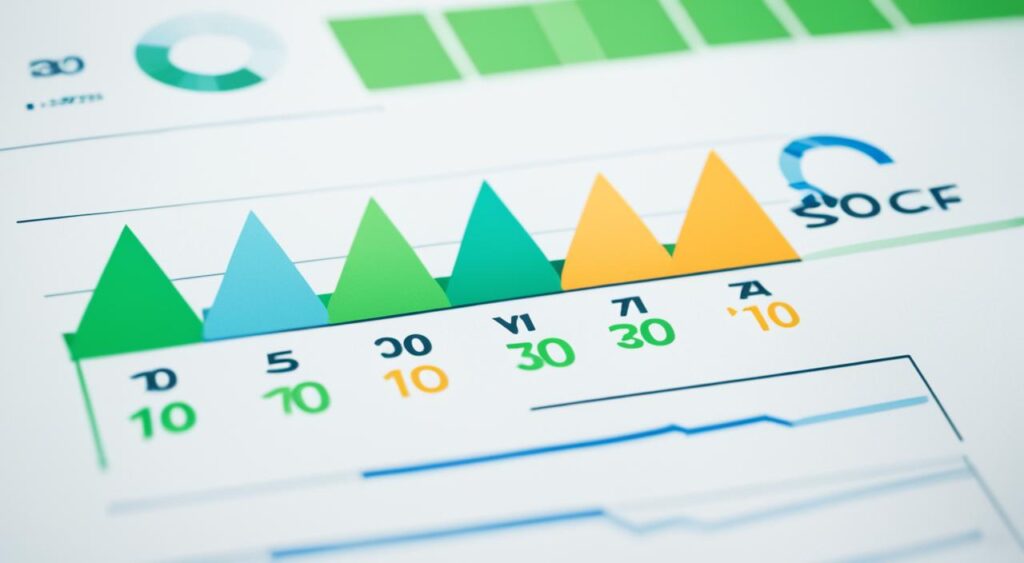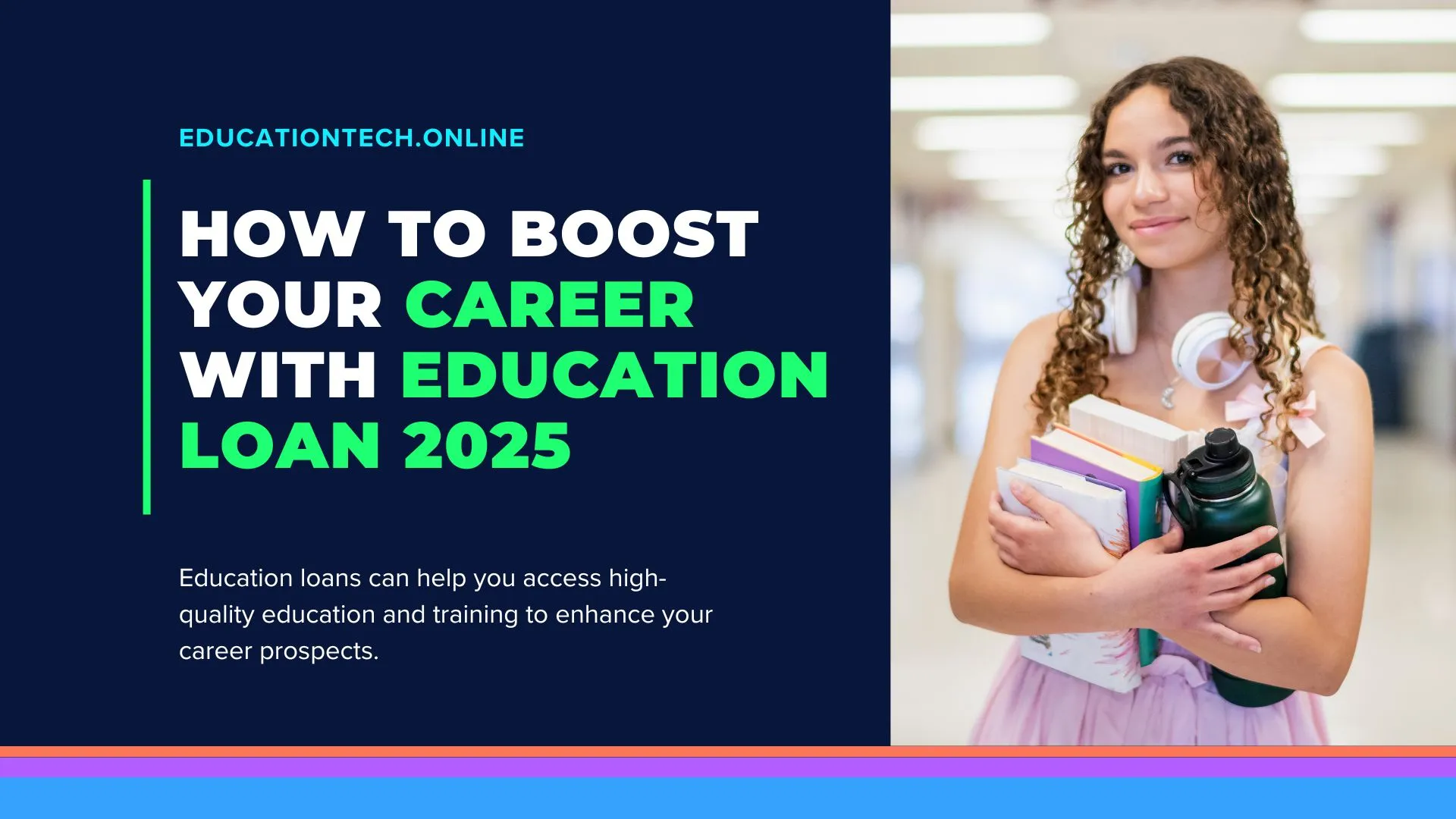In today’s job market, investing in your education can boost your career. An education loan can open doors to new skills, career changes, or higher education. This guide will show you how an education loan can change your career path. We’ll also give you strategies to use this financial tool wisely.

Key Takeaways
- Education loans can help you access high-quality education and training to enhance your career prospects.
- Understand the different types of education loans, including federal and private options, to find the best fit for your needs.
- Develop a solid repayment strategy to manage your education loan effectively and maintain a healthy credit score.
- Choose an accredited educational program that aligns with your career goals for the maximum return on your investment.
- Leverage networking and professional development opportunities to complement your education and further boost your career growth.
Also Read: Apply for Educational Loan Online in India
Introduction: Unlocking Your Potential with an Education Loan
Education is the base of our dreams and future. In today’s job market, investing in your education is crucial. An education loan can start a journey that boosts your knowledge and skills. This can also improve your career chances.
Looking for specialized training, an advanced degree, or more professional growth? An education loan can help make your dreams come true. It gives you the funds to get the skills and qualifications that make you stand out.
We’ll look at the many benefits of using an education loan and how to make sure your education pays off. Let’s start a journey of growth, with education and an education loan as our guides.
Also Read: Education Loan – Apply for Student Loan Online in India
“Education is the most powerful weapon which you can use to change the world.” – Nelson Mandela
Understanding the Importance of Lifelong Learning
In today’s fast-changing job world, learning new things is key for career growth. By always learning, we can keep up with new trends and be valuable to employers.
Staying Ahead in a Competitive Job Market
An education loan helps us grow our skills and knowledge. This makes us ready to face the job competition and do well in our fields. By always learning, we get new skills, stay current, and stand out from others.
Expanding Your Knowledge and Skills
- Gain a deeper understanding of emerging industry trends and technologies
- Develop specialized expertise that sets us apart and boosts our career prospects
- Enhance our problem-solving abilities and critical-thinking skills
- Stay adaptable and agile in a constantly changing job market
Also Read: Education Loan Scheme – Interest Rates
With an education loan, we can invest in our growth. This opens doors for lifelong learning, career growth, and success in the job market.
Exploring Types OF Loan
Getting the money you need for college is key. Luckily, there are many education loan options out there. Let’s look at federal and private student loans.
Also Read: Top Free Sites For Download Images And Videos
Federal Student Loans
Federal student loans come from the U.S. government. They have fixed interest rates and flexible repayment plans. Many students choose them because they have lower interest rates and better terms. Federal loans have many benefits, such as:
- Fixed interest rates, ensuring predictable monthly payments
- Multiple repayment options, including income-driven plans that can lower your monthly payments
- Potential for loan forgiveness programs, which can help ease the burden of debt
Private Student Loans
If you need more money after federal loans, private student loans can help. These come from banks, credit unions, and other lenders. They offer more flexibility in loan amounts and repayment terms. But, they usually have variable interest rates that can change. It’s important to look at different lenders to find the best deal for you.
When deciding between federal and private loans, think about what you need for your education and finances. Knowing about education loan options can help you get the education you want and set you up for success.
“Investing in your education is one of the best decisions you can make for your future.”
Calculating the Cost of Your Education
Before starting your education, it’s key to understand the costs involved. These include tuition, fees, textbooks, and more. A student loan calculator helps us figure out the total cost and how much we might need to borrow.
Planning your finances well is crucial to avoid borrowing too much. This ensures you can manage your payments later. Let’s look at the main things to think about when figuring out your education costs:
- Tuition and Fees: Tuition varies a lot by school, program, and where you live. Make sure to check the costs for your program.
- Textbooks and Supplies: Books and materials can get expensive. Include these costs in your total education budget.
- Living Expenses: If you’re moving away, remember to budget for housing, food, transport, and other living costs.
- Additional Costs: Think about extra fees, lab fees, or costs for clubs or internships too.
| Category | Average Cost |
|---|---|
| Tuition and Fees (In-State) | $25,000 |
| Textbooks and Supplies | $1,200 |
| Housing and Meals | $10,800 |
| Transportation | $2,000 |
| Total Estimated Cost | $39,000 |
A student loan calculator lets you put in costs and check out different loan options. You can see repayment plans and how they’ll affect your finances later. This helps you make smart choices for your education.
“Education is the most powerful weapon which you can use to change the world.”
– Nelson Mandela
Developing a Repayment Strategy
Starting your education means you need a solid plan for paying back your student loans. Look into different options to match your payments with your budget. This way, you can smoothly move from school to a good career.
Also Read: Top 10 AI Tools For Education
Income-Based Repayment Plans
Income-based repayment plans are a great choice for managing your loans. They set your payments based on what you can afford each month. This approach helps you avoid high, fixed payments and builds a stable financial future.
Loan Forgiveness Programs
There are also loan forgiveness programs to consider. These include the Public Service Loan Forgiveness (PSLF) and the Teacher Loan Forgiveness program. They help those in public service or teaching roles reduce or wipe out their loans. Exploring these options can ease your loan burden and boost your career.
Creating a repayment plan tailored to you is crucial. By looking into all your options and getting advice when needed, you can handle your loans well. This lets you focus on your career goals.
“Developing a repayment strategy is not just about managing your finances – it’s about investing in your future and unlocking your full potential.”
Choosing the Right Educational Program
Choosing the right educational program is key to getting a good return on your investment. Look at accredited institutions and compare online and traditional learning. This way, you can find the best match for your career goals and how you like to learn.
Evaluating Accredited Institutions
It’s important to check the quality and recognition of your education. Make sure to choose accredited institutions that have been approved by well-known accrediting bodies. These schools have high standards, making sure your degree is respected by employers and other schools.
Online vs. Traditional Learning
Deciding between online education and traditional, on-campus learning affects your school life and personal life. Online learning lets you study at your speed and fit it with work, family, and other activities. On the other hand, traditional learning offers face-to-face classes, hands-on experiences, and a lively campus life.
Think about how you like to learn, your schedule, and what you prefer when choosing between online and traditional education. Look into the quality, accreditation, and reputation of both to make a choice that fits your goals.

“Investing in education is one of the wisest decisions you can make, and with the right loan strategy, it can open doors to a brighter future.”
Networking and Professional Development
Getting an education loan gives you a chance to grow your professional network and improve yourself. While you study, making connections and learning more can help your career. It’s a great way to make your future brighter.
Networking is key to meeting people in your field, finding mentors, and getting job leads. Go to conferences, join groups, or use online networks to meet experts. They can share their knowledge and help you find new paths in your career.
Also, growing professionally can make you more appealing to employers. Look into workshops, seminars, or online classes that match your career goals. These can keep you updated, give you special skills, and show you’re serious about learning.
- Attend industry conferences and networking events to expand your professional connections.
- Participate in professional associations or online communities related to your field of study.
- Seek out mentorship programs or informational interviews with industry leaders.
- Explore online courses, workshops, or certifications to enhance your skills and knowledge.
- Volunteer for projects or organizations that align with your career aspirations.
Using your education loan for networking and growth can open many doors for you. It’s a smart way to boost your career. Invest in yourself, build a strong network, and set yourself up for success in your field.
| Networking Strategies | Professional Development Opportunities |
|---|---|
| Attend industry conferences and events Join professional associations Utilize online networking platforms Reach out to industry mentors Participate in informational interviews | Enroll in online courses or certifications Attend workshops or seminars Pursue additional degrees or specializations Volunteer for relevant projects or organizations Engage in self-directed learning and research |
“Networking is not about just connecting people. It’s about connecting people with people, people with ideas, and people with opportunities.” – Dr. Ivan Misner, Founder of BNI
Education Loan and Your Credit Score
Dealing with education loans can greatly affect your credit score. It’s key to know how these loans impact your creditworthiness. Also, it’s important to use good strategies to manage your credit.
Managing Your Credit Responsibly
Keeping a good credit score is vital, especially after you’ve paid for your education with a student loan. Here are some tips to help you manage your credit well:
- Make timely payments: It’s crucial to stay on top of your loan repayments. Late or missed payments can hurt your credit score. So, set up automatic payments or reminders to help you remember.
- Monitor your credit report: Check your credit report often for errors or fraud. Fixing these problems quickly can protect your credit score.
- Utilize credit-building strategies: Use methods like credit utilization and credit mix to show you’re managing credit well. This can improve your credit score over time.
By following these tips, your education loan can help build a strong credit profile. This can open up more financial opportunities for you in the future.

“Responsible borrowing and timely repayment of your education loan can be a powerful tool in building a robust credit history and securing a bright financial future.”
Your credit score, student loan, and credit management are all connected. By understanding this and taking action, you can use your education loan to improve your financial health.
Balancing Work, Education, and Personal Life
Getting an education while handling work and personal life is tough. But, it’s doable with the right strategies. By managing time well and taking care of ourselves, we can handle work, school, and our personal lives. This approach helps us use our education loans wisely and reach our career dreams.
Keeping a good work-life balance means managing time well. Create a schedule, set priorities, and delegate tasks when you can. It’s key to take breaks and recharge, whether through exercise, meditation or being with family.
- Develop a detailed schedule that allocates time for work, study, and personal activities.
- Prioritize tasks based on their importance and urgency, and learn to say no to non-essential commitments.
- Utilize productivity tools and apps to stay organized and on top of your workload.
- Regularly review and adjust your schedule to ensure it remains realistic and sustainable.
Looking after your health is also vital. Exercise regularly, eat well, and do things that make you happy and relaxed. Getting support from friends, family, or a counselor can help with stress from juggling many responsibilities.
“The key to work-life balance is to not let your work life encroach on your personal life, and vice versa. It’s about finding harmony and making time for what’s truly important.”
Using these tips, you can live a fulfilling life that supports your education loan-funded studies, and work-life balance. Remember, taking care of yourself is as crucial as reaching your goals.
Education Loan: A Wise Investment in Your Future
An education loan can be a smart choice for your future. It opens doors to more career chances and personal growth. By using this loan, we can get the funds for new skills, career changes, or higher education. This helps us set ourselves up for success over time.
Education loans offer more than just learning. They help us reach our career goals and reach our full potential. If we want to improve our skills, try a new field, or move up in our careers, a loan can help make it happen.
Choosing an education loan is a big step towards a better future. It lets us open new doors and see new things. It also makes us stronger in the job market. The benefits of an education loan last a long time, making it a smart move for career and personal growth.
FAQ
What is an education loan and how can it benefit my career?
An education loan helps you fund your education. It lets you pay for special training, advanced degrees, or professional programs. This investment can boost your career by giving you new skills and knowledge.
What are the different types of education loan options available?
There are two main types of education loans: federal and private. Federal loans come from the government and have fixed rates and flexible repayment plans. Private loans are from banks and can have variable rates and more features.
How can I ensure I borrow the right amount for my education?
It’s important to know the total cost of your education before getting a loan. This includes tuition, fees, and books. Use a student loan calculator to figure out how much you need. This way, you won’t borrow too much and can manage your payments better.
What strategies can I use to manage my education loan repayment effectively?
Creating a good repayment plan is key to managing your loan. Look into income-based plans that match your income. Also, consider loan forgiveness programs to reduce your debt. A personalized plan will help you smoothly move from school to your career.
How can an education loan impact my credit score, and what can I do to maintain a healthy credit profile?
Handling your education loan right can greatly affect your credit score. Pay on time and manage your credit well to keep a good credit score. Knowing how loans affect your credit and using smart strategies will help your education investment improve your credit and open more financial doors.
How can I balance work, education, and personal demands while using an education loan?
It’s tough to balance work, school, and life, but it’s doable with good planning and discipline. Use time management, take care of yourself, and use resources wisely. This approach will help you make the most of your loan and reach your career goals.

Can you be more specific about the content of your article? After reading it, I still have some doubts. Hope you can help me.